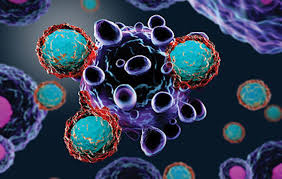Many research have been done, about cancer victim ,many thoughts have been created about this worse decease but still no one have attain any specific results.But now new hope have cover this topic .As per Brigham and Women's Hospital, sequencing innovation has as of late shown that the stomach microbiome may likewise assume a part in malignant growth treatment alongside its different advantages.
The discoveries of the examination were distributed in the diary 'JAMA Oncology'.
The ongoing comprehension of the association between the stomach microbiome and helpful reaction to immunotherapy, chemotherapy, disease medical procedure, and that's just the beginning, focuses to ways that the microbiome could be designated to further develop therapy.
We realize that a solid stomach is a key to our general wellbeing," said lead creator Khalid Shah, MS, PhD, of the Center for Stem Cell and Translational Immunotherapy in the Department of Neurosurgery at the Brigham.
He said, "Our stomach is vital to the point that we frequently allude to it as our 'second' mind. Lately, we've started to see the value in the numerous jobs of the stomach, including the stomach mind association and the association between the stomach and our resistant framework. Then again, stomach brokenness or dysbiosis can adversely affect our wellbeing."
Shah and his associates report on an arising job for stomach microbiota in immunotherapy. Insusceptible designated spot inhibitors and invulnerable designated spot barricade treatment are novel methodologies for treating malignant growth, however the reaction to these types of therapy changes extensively among people and across disease types.
A few investigations have observed contrasts in the types of microorganisms found in waste examples from responders and non-responders, proposing that different microbiome organizations might impact clinical reactions.
Different investigation srecommend that eating routine and probiotics — live bacterial species that can be ingested — as well as anti-microbial meds and bacteriophages, can impact the organization of the stomach microbiome and, thus, a reaction to immunotherapy. Specifically, the creators feature late investigations on the impacts of ketogenic slims down on patients with malignant growth.
"Today, creating medicines that sync immunotherapies and stomach microbiota gives medication a remarkable chance to really impact change ongoing consideration," said Shah.
The creators additionally give an outline of how microbiota have been embroiled in impacting reaction to chemotherapy and other ordinary malignant growth therapies as well as how disease treatments may equally influence the microbiome and cause secondary effects.
"By and large, these discoveries support the capability of affecting the stomach microbiota to reduce the results of regular malignant growth treatment," said Shah.
The creators note that there is minimal comprehension of what the "ideal" microorganisms consortia in the stomach seem to be and how discoveries from preclinical models might possibly convert into applications in people. They note that watchfulness should be practiced prior to utilizing probiotics or rolling out dietary improvements.
Numerous disease clinical preliminaries are right now investigating the impact of the microbiome to assist with tending to a portion of the limits and holes in understanding. These incorporate preliminaries of waste microbial transplantation, dietary enhancements, and novel medications that might impact microbiota creation.
"There is solid proof that the stomach microbiome can affect malignant growth treatments," said Shah. "There stay invigorating potential outcomes to investigate, including the impact of solid eating routine, probiotics, novel treatments, and that's only the tip of the iceberg," he added










0 comments:
Post a Comment